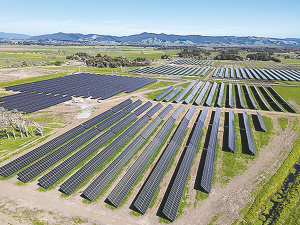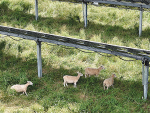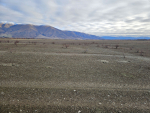There are plenty of possibilities for successful farming operations in, under and around largescale solar electricity generation installations.
That’s the claim of one of New Zealand’s foremost agrisolar companies, Lodestone Energy.
“There’s a lot of ways to do this, there’s a lot of examples in America, in Europe, where these practices are evolving,” says Lodestone managing director Gary Holden.
Lodestone came online late last year with what is currently the country’s largest gridconnected solar farm, at Kaitaia. It has four more in development in the North Island, and recently revealed a push into the South Island with consents granted for three sites in Canterbury. Its current three-phase expansion plan envisages a total of 19 farms around the country.
Holden told Rural News that will mean 19 slightly different farming arrangements because at the end of the day it will be each farmer’s decision on how they use the land under the rows of 2.3m high panels.
“The very simple version is you just run sheep like you would if you were rotating them through paddocks in a typical grazing scenario,” he explains. “But it’s early days and we’ve got a lot to learn. And then over time, we’ll try other things. We’ll try horticulture, we’ll try cattle. So far, sheep looks like it’s going to work really well.”
Holden says it’s important to realise that farming isn’t a big part of the overall economics of a solar plant but it was about creating a scenario where the farm can be retained as a productive unit.
Stocking numbers can be maintained at 80-85% of what they might have been without the panels, while studies have shown that the shade can actually be beneficial, he said.
“You think about the way that summer heat bakes grass and turns it brown – a bit of shade can actually yield more volume of grass through the summer period,” he adds.
“The sheep also apparently do better in shade. They can hide from rain. They overheat less. We are expecting to find that the sheep do better.
“If there’s a wool production component to the operation then we’ve heard that potentially the wool quality will be better because it’s got those degrees of protection.”
Holden says there’s a “growing brains trust” building knowledge on how to farm under solar panels and more will be known in three, four or five years from now.
 |
|---|
|
Lodestone Energy managing director Gary Holden.
|
“But there is nothing we’ve heard that would suggest that it’s a bad idea,” he told Rural News. “As long as we’re not, you know, putting goats and things that might want to climb on the panels, we are pretty safe to start out with sheep and then evolve from there."
While some operators may choose fixed panels, Holden says Lodestone had made a design decision to standardize on electrically operated swivelling solar panels that track the sun through the day. This was because Lodestone sells electricity direct to customers – such as a recent deal to supply power to 260 stores for the Warehouse retail group. He claims investing in the tracking mechanisms meant Lodestone could get a lot more production in the shoulders of the day to better match the stores’ long opening hours.
Holden agrees that horticulture could be more complicated to integrate, particularly in choosing crops that won’t interfere with the rotating mechanism.
“Again, it’ll be experimenting. We’ll probably do a bunch of trials – we’ll take parts of different farms in different parts of the country to experiment with different things. It’s a work in progress.”




















